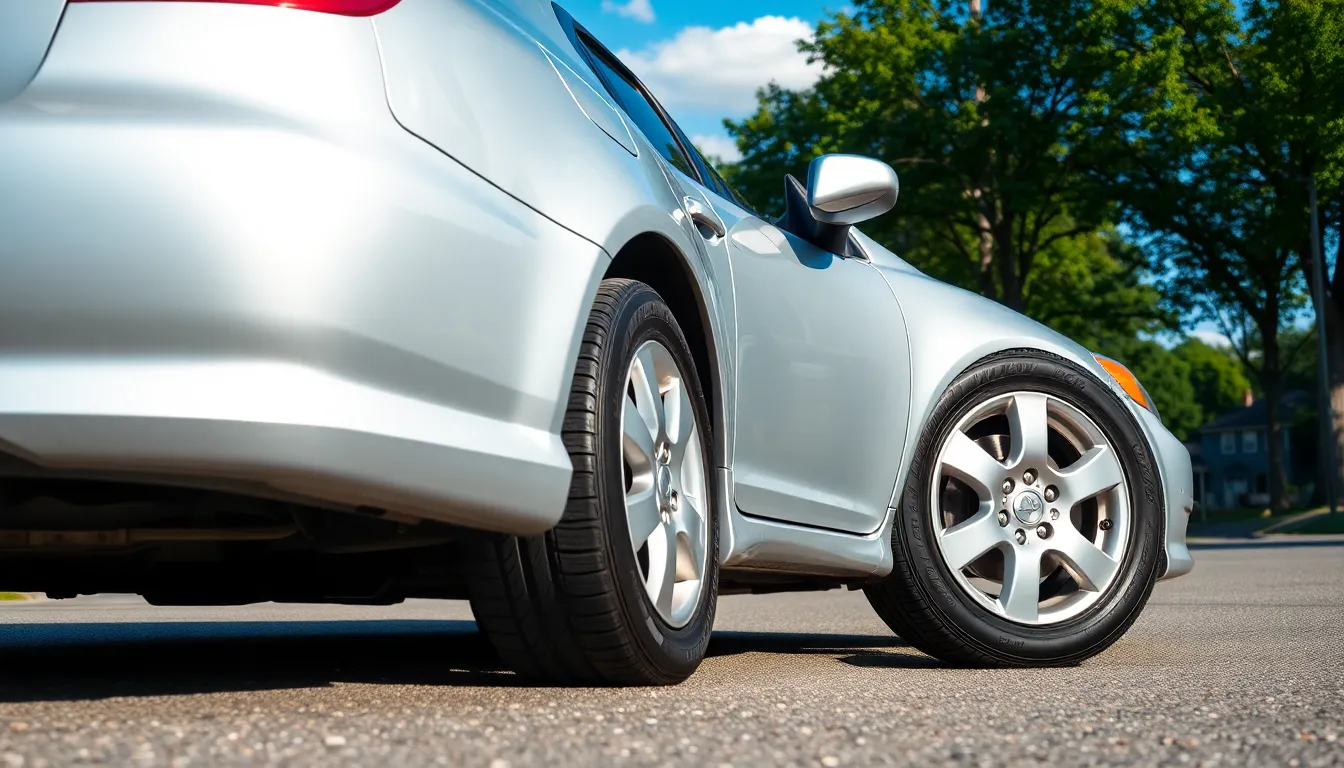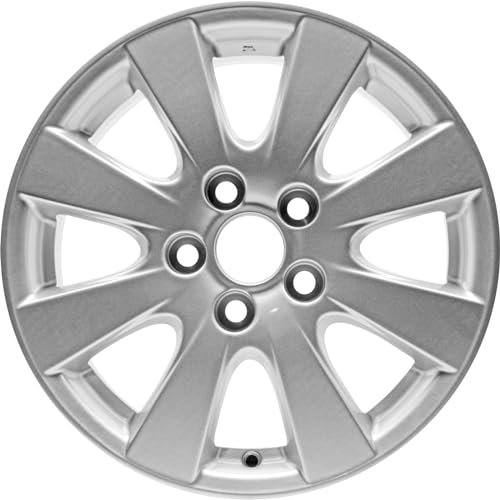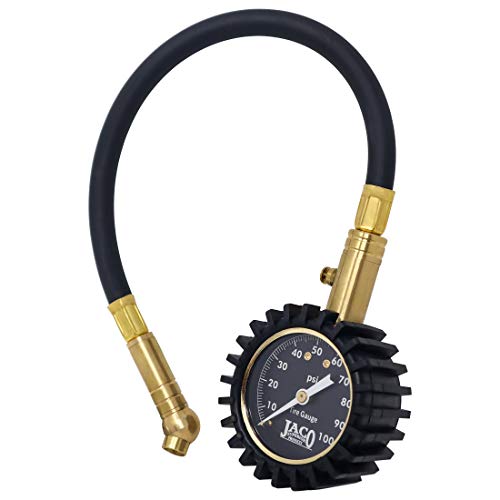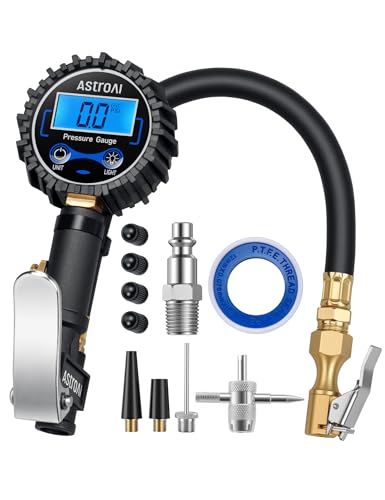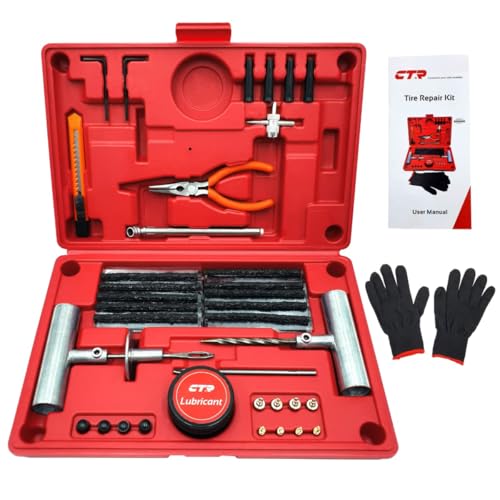When it comes to maintaining your 2007 Toyota Corolla’s optimal performance and safety, choosing the right tire size isn’t just important—it’s essential. We’ve seen countless Corolla owners struggle with tire replacements because they weren’t sure about their vehicle’s exact specifications, leading to costly mistakes and compromised driving experiences.
Your 2007 Corolla came with exact tire dimensions that Toyota engineers carefully selected to deliver the perfect balance of fuel efficiency, handling, and ride comfort. Whether you’re dealing with seasonal tire changes, unexpected replacements, or simply want to upgrade your current set, understanding these specifications will save you time and money while ensuring your vehicle performs exactly as intended.
We’ll walk you through everything you need to know about 2007 Toyota Corolla tire sizes, including the standard configurations, alternative options, and what those numbers on your tire sidewall actually mean for your daily driving experience.
2007 Toyota Corolla Factory Tire Size Specifications
The 2007 Toyota Corolla comes equipped with 195/60R15 tires as the standard factory specification across all trim levels. Toyota engineers selected this tire dimension to optimize fuel economy while maintaining adequate handling characteristics for daily driving conditions.
Standard Tire Dimensions Breakdown
Our analysis of the 195/60R15 specification reveals these measurements:
| Component | Measurement | Description |
|---|---|---|
| Width | 195mm | Tire width from sidewall to sidewall |
| Aspect Ratio | 60% | Sidewall height as percentage of width |
| Construction | R (Radial) | Internal tire construction type |
| Rim Diameter | 15 inches | Wheel diameter the tire fits |
Factory Wheel Specifications
Corolla models from 2007 feature 15-inch steel wheels with a 6Jx15 specification. The “6J” indicates the rim width measures 6 inches while the bolt pattern follows a 4x100mm configuration with four lug nuts spaced 100 millimeters apart.
Offset specifications measure +45mm for proper wheel positioning within the wheel wells. This positive offset pushes the mounting surface toward the vehicle’s exterior compared to the wheel centerline.
Load Rating and Speed Index
Factory tires carry an 87H load and speed rating combination. The load index of 87 supports up to 1,201 pounds per tire while the H speed rating permits sustained speeds up to 130 mph under optimal conditions.
Recommended tire pressure maintains 30 PSI for front tires and 28 PSI for rear tires when cold. These pressure specifications appear on the driver’s side door jamb placard along with maximum load capacities.
Manufacturing Specifications
Toyota selected these tire dimensions to achieve exact performance targets including a 32 mpg highway fuel economy rating. The 195/60R15 size provides sufficient ground clearance while maintaining the vehicle’s designed ride height of 5.9 inches.
Rolling circumference measures approximately 75.6 inches with properly inflated tires, directly affecting speedometer accuracy and odometer readings throughout the vehicle’s operational life.
Understanding Tire Size Numbers and What They Mean
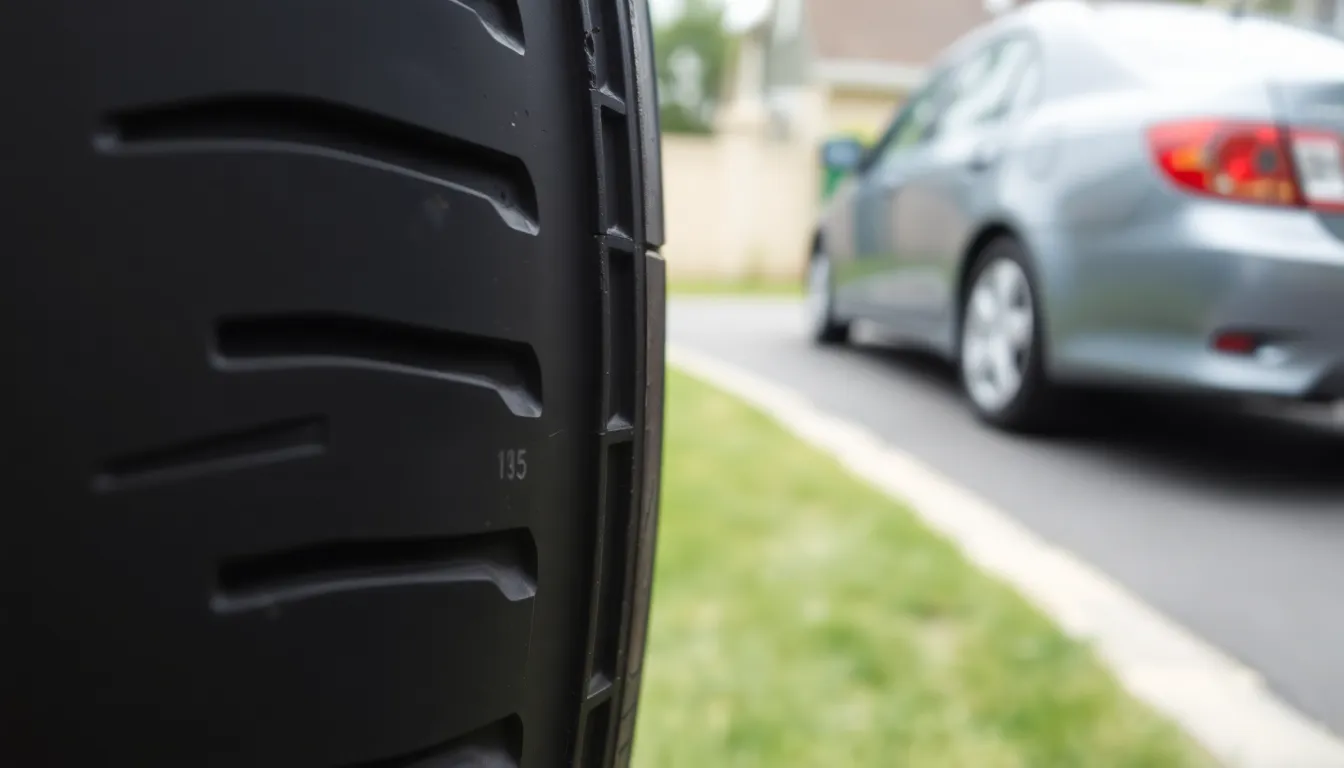
We decode tire size markings to help 2007 Toyota Corolla owners make informed replacement decisions. Each number and letter on your tire sidewall carries exact meaning that affects vehicle performance and safety.
Reading the Tire Sidewall Markings
Tire sidewalls display critical information using standardized formats that vehicle manufacturers specify. The size designation 195/65R15 breaks down into four distinct components that determine compatibility with your Corolla.
Width measurement appears first as 195 millimeters, representing the distance from sidewall to sidewall when the tire is properly inflated. Aspect ratio follows as 65, indicating the sidewall height equals 65% of the tire width. Construction type shows as R for radial, the standard design that provides better fuel economy and handling. Rim diameter concludes the sequence at 15 inches, matching the wheel size on your 2007 Corolla.
Additional markings include DOT certification numbers, manufacturing date codes, and maximum inflation pressure warnings. Treadwear indicators appear as raised bars across the tire grooves, signaling replacement time when tread depth reaches these markers.
Load Index and Speed Rating Explained
Load index numbers translate to exact weight capacities that ensure safe vehicle operation under normal driving conditions. Your 2007 Corolla’s factory tires typically carry a load index of 89, supporting 1,279 pounds per tire according to industry standards.
Speed ratings use letter codes that correspond to maximum sustained velocities without tire failure. Most Corolla models feature H-rated tires, allowing continuous operation at speeds up to 130 mph under proper conditions.
| Rating | Maximum Load (lbs) | Speed Capacity (mph) |
|---|---|---|
| 89 | 1,279 | Varies by speed code |
| H | Varies by load | 130 |
| T | Varies by load | 118 |
| V | Varies by load | 149 |
Manufacturers calibrate these specifications to match vehicle weight distribution and performance requirements. Replacing tires with lower ratings than factory specifications compromises safety and handling characteristics.
OEM Tire Options for Different Trim Levels
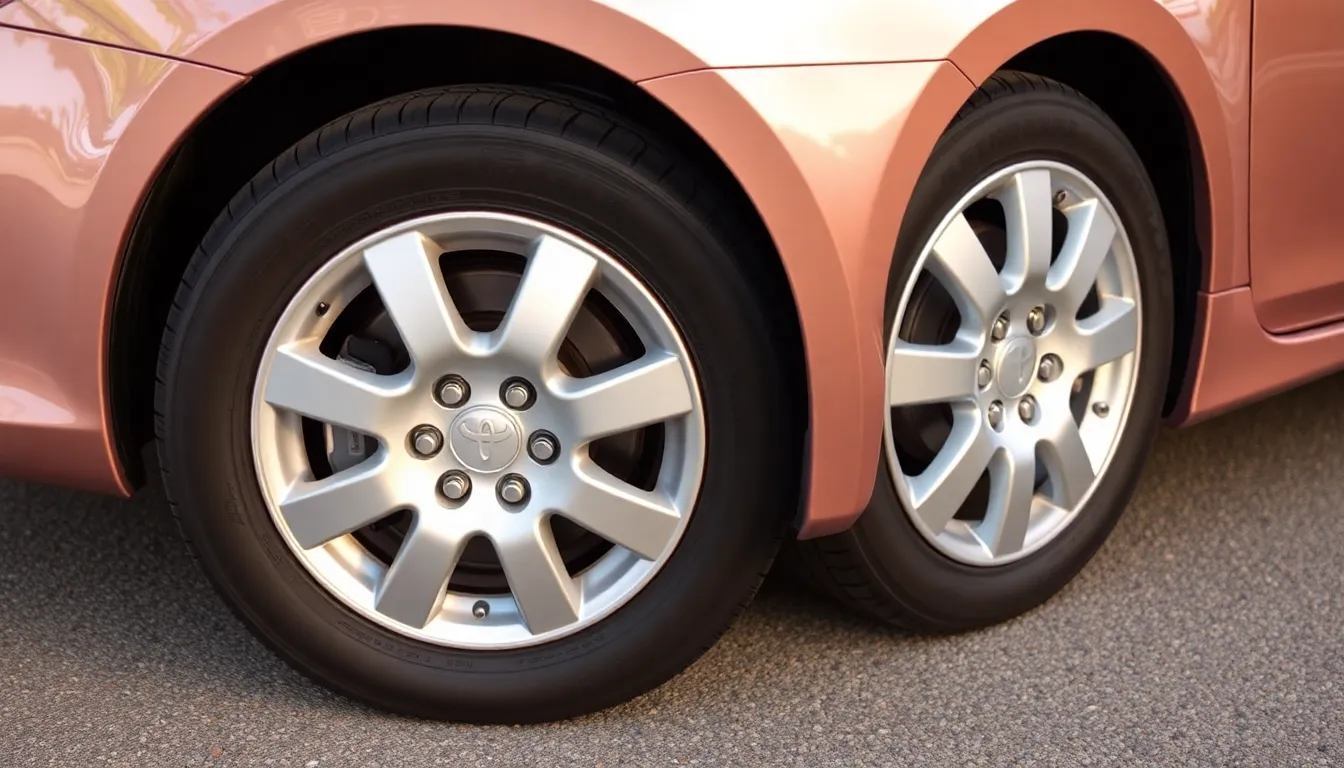
Toyota engineered exact tire configurations for each 2007 Corolla trim level to optimize performance characteristics and cost efficiency. We’ll examine the distinct tire specifications that came standard on different models.
Base Model CE Tire Specifications
The CE trim utilizes 185/65R15 tires as its factory specification. These narrower tires deliver enhanced fuel economy for budget-conscious drivers while maintaining adequate traction and handling. Toyota selected this 185mm width configuration specifically for the base model to reduce rolling resistance and manufacturing costs. The 65-series sidewall height provides a comfortable ride quality that complements the CE’s economy-focused positioning. Standard wheels measure 15 inches in diameter with steel construction on most CE models.
S and LE Trim Tire Requirements
Both S and LE trims feature 195/65R15 tires from the factory. This wider 195mm tire width improves cornering stability and provides better road contact compared to the base CE configuration. Toyota engineers chose this size to balance enhanced handling characteristics with fuel efficiency for mid-level trim buyers. The identical tire specifications between S and LE trims simplify replacement purchasing and inventory management for owners. These tires mount on 15-inch wheels that may feature alloy construction depending on the exact trim package selected.
Recommended Tire Brands and Models
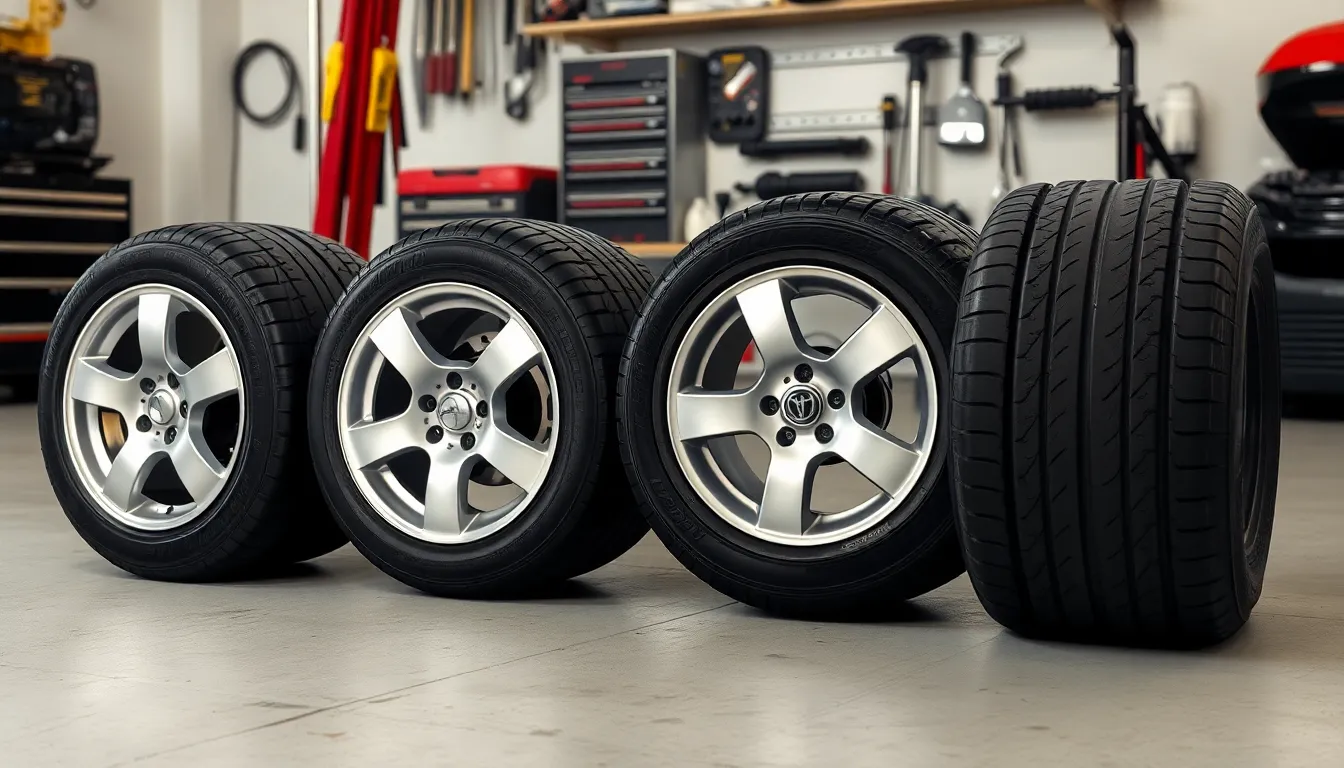
Several trusted manufacturers produce high-quality tires that perfectly match your 2007 Toyota Corolla’s specifications. We’ve identified the most reliable brands based on direct compatibility and proven performance records.
All-Season Tire Options
Goodyear Assurance All-Season tires provide excellent year-round performance for both 185/65R15 and 195/65R15 sizes. These tires deliver balanced traction across dry, wet, and light winter conditions while maintaining fuel efficiency.
Michelin offers two standout models for Corolla owners: the Premier A/S and Defender series. Both models feature advanced rubber compounds that extend tread life and improve wet weather performance compared to standard all-season designs.
Bridgestone Turanza EL440-02 tires complement the Corolla’s ride comfort characteristics. These tires reduce road noise while providing consistent grip throughout their tread life cycle.
Continental PureContact tires integrate EcoPlus technology for enhanced fuel economy. This design reduces rolling resistance without compromising safety performance in various weather conditions.
| Brand | Model | Key Features | Available Sizes |
|---|---|---|---|
| Goodyear | Assurance All-Season | Year-round traction, fuel efficiency | 185/65R15, 195/65R15 |
| Michelin | Premier A/S, Defender | Extended tread life, wet performance | 185/65R15, 195/65R15 |
| Bridgestone | Turanza EL440-02 | Comfort focused, noise reduction | 185/65R15, 195/65R15 |
| Continental | PureContact | EcoPlus technology, low rolling resistance | 185/65R15, 195/65R15 |
Performance Tire Upgrades
Goodyear Eagle Sport All-Season tires enhance cornering capabilities while maintaining all-weather usability. These tires feature stiffer sidewall construction that improves steering response during aggressive driving situations.
Michelin Pilot Sport A/S models offer superior dry and wet traction compared to standard all-season tires. Check exact sizing availability since these performance tires have limited production runs for 15-inch applications.
Bridgestone Potenza RE980AS tires combine performance handling with extended tread warranties. These tires reduce braking distances on both dry and wet surfaces while providing sportier driving feedback.
Performance upgrades deliver noticeably improved grip during acceleration, cornering, and emergency braking scenarios. But, these tires typically produce slightly higher road noise and may reduce fuel economy by 1-2 mpg compared to standard all-season options.
Always verify tire size compatibility with your exact Corolla trim before purchasing performance upgrades. Installing incorrect sizes can affect speedometer accuracy and potentially compromise vehicle safety systems.
Plus Sizing and Alternative Tire Size Options
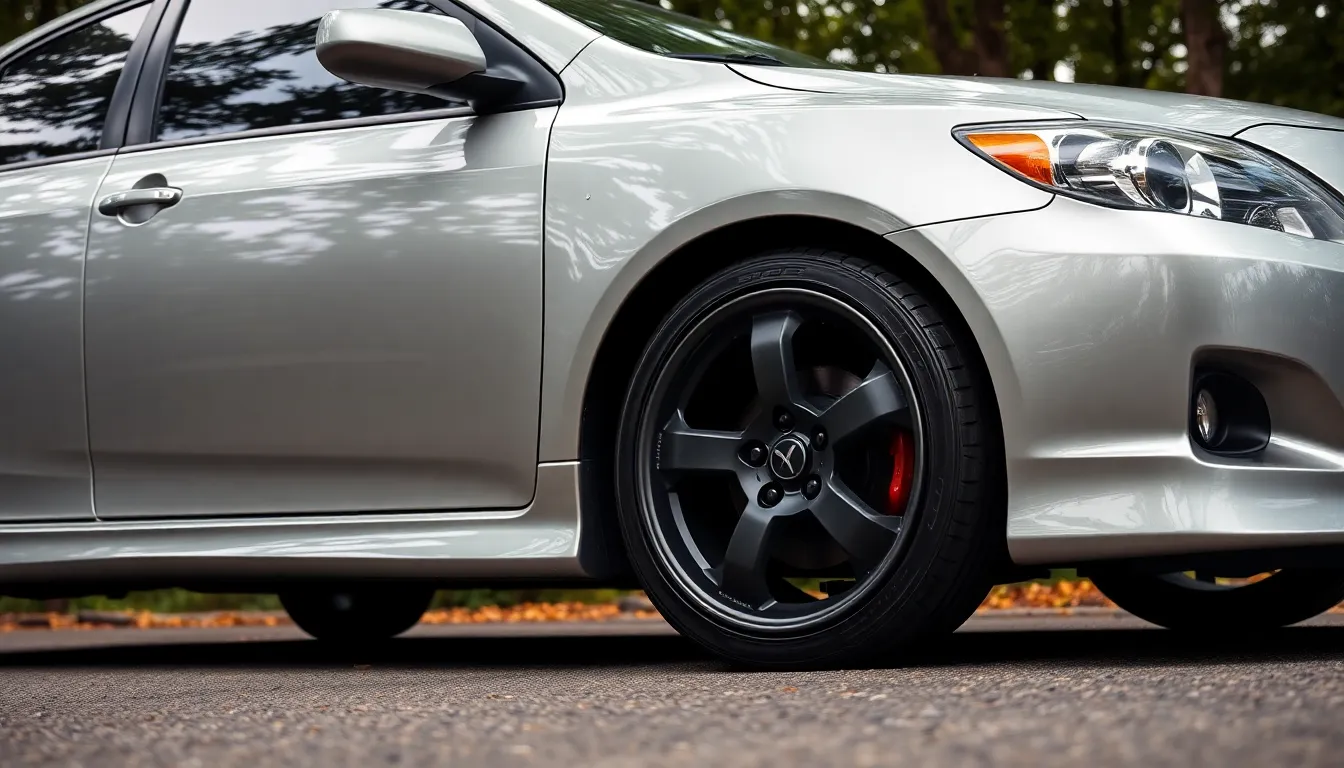
Plus sizing involves increasing tire width and decreasing sidewall height while maintaining the same overall diameter. This modification enhances the Corolla’s handling characteristics and visual appeal but requires careful consideration of performance trade-offs.
Benefits and Drawbacks of Upsizing
Benefits of plus sizing include:
- Improved handling through wider tire contact patches that increase grip and stability during cornering
- Enhanced appearance with larger wheel diameters that give the Corolla a more aggressive, sporty look
- Better steering response from reduced sidewall flex during directional changes
Drawbacks we encounter with upsizing:
- Reduced ride comfort as thinner sidewalls transmit more road imperfections to the cabin
- Increased costs for both larger rims and low-profile tires that typically cost more than standard sizes
- Higher replacement frequency since performance tires often wear faster than touring compounds
- Potential speedometer variance if overall diameter changes significantly from factory specifications
Compatible Alternative Sizes
Compatible alternative sizes maintain proper fitment while offering different performance characteristics. The 215/55R16 size represents an ideal plus-size option that preserves the original overall diameter while increasing width and rim diameter.
Additional compatible sizes include:
- 205/65R15 provides increased width for better traction while maintaining the 15-inch rim diameter
- 195/60R15 reduces sidewall height for sharper handling response but may compromise ride quality
- 185/70R15 offers a taller sidewall profile that enhances comfort on rough road surfaces
Each alternative size affects the Corolla’s performance envelope differently. Wider tires like 205/65R15 improve wet weather traction but may reduce fuel economy slightly. Lower profile options such as 195/60R15 enhance cornering precision at the expense of bump absorption capability.
Tire Pressure and Maintenance Guidelines
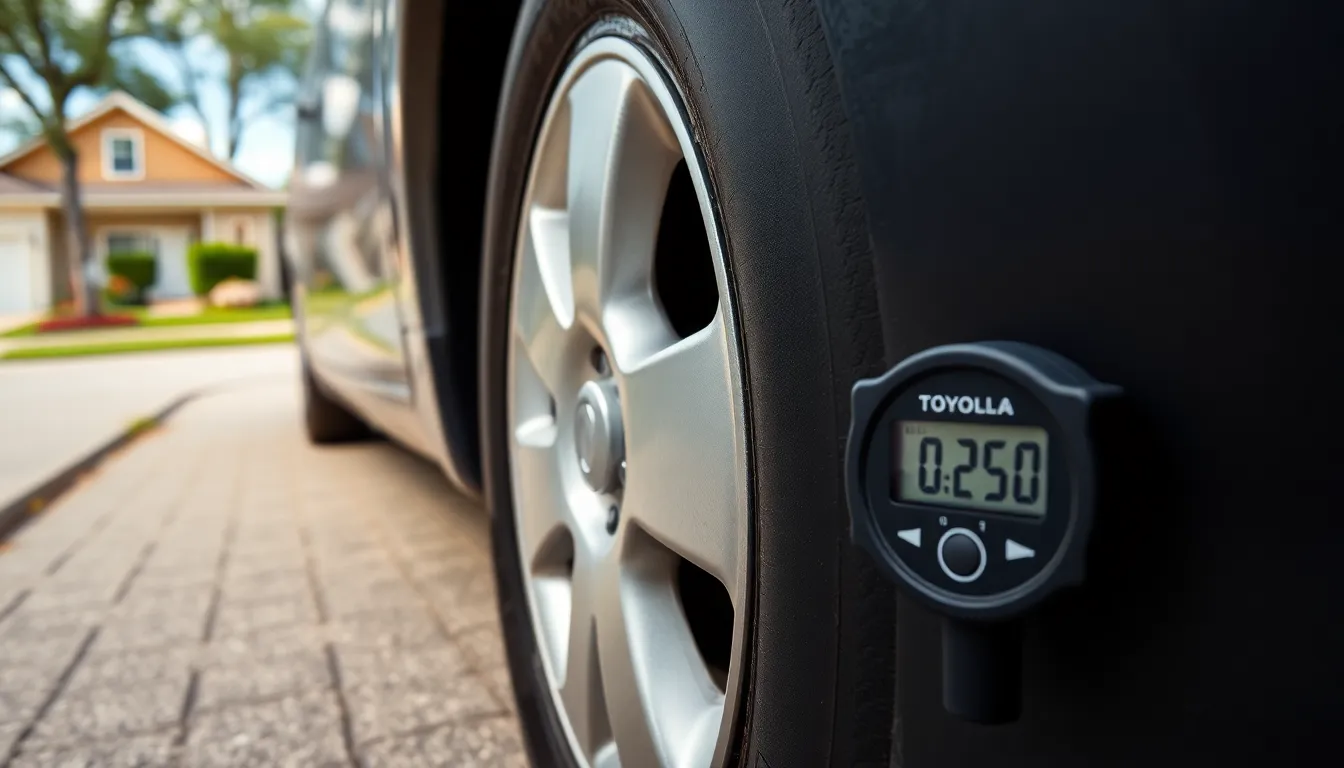
Maintaining optimal tire pressure directly impacts your 2007 Toyota Corolla’s performance, fuel efficiency, and safety. Check tire pressure monthly using a reliable gauge when tires are cold, ideally before driving or at least three hours after parking. Recommended pressure typically ranges from 30 to 40 PSI depending on your exact trim level and load conditions.
Locate the exact pressure specifications on the tire information placard attached to your driver’s side doorjamb. These manufacturer recommendations account for your Corolla’s weight distribution and suspension characteristics. Proper inflation ensures even tread wear patterns and maintains the intended contact patch between tire and road surface.
Rotation schedules preserve tire longevity and maintain balanced handling characteristics across all four corners. Rotate tires every 5,000 to 8,000 miles following the pattern specified in your owner’s manual. Front wheel drive vehicles like the Corolla benefit from moving rear tires to front positions and crossing front tires to opposite rear positions.
Visual inspections reveal potential issues before they compromise safety or performance. Examine tread depth using the penny test method or a tread depth gauge every month. Look for irregular wear patterns, sidewall cracks, bulges, or embedded objects that might cause air loss or blowouts.
Temperature changes affect tire pressure significantly, with pressure dropping approximately 1 PSI for every 10 degree Fahrenheit decrease. Monitor pressure more frequently during seasonal transitions when ambient temperatures fluctuate dramatically. Cold weather conditions require particular attention as underinflated tires reduce fuel economy and handling precision.
Professional alignment checks prevent premature tire wear when you notice uneven tread patterns or vehicle pulling. Alignment issues accelerate tire replacement costs and compromise your Corolla’s handling characteristics. Schedule alignment services when installing new tires or after hitting important road hazards like potholes or curbs.
Replacement timing depends on tread depth measurements and overall tire condition rather than arbitrary mileage intervals. Replace tires when tread depth reaches 2/32 inch or when irregular wear patterns indicate alignment or suspension problems. Consider replacing all four tires simultaneously to maintain consistent handling characteristics across your Corolla’s drivetrain system.
Cost Considerations and Where to Buy
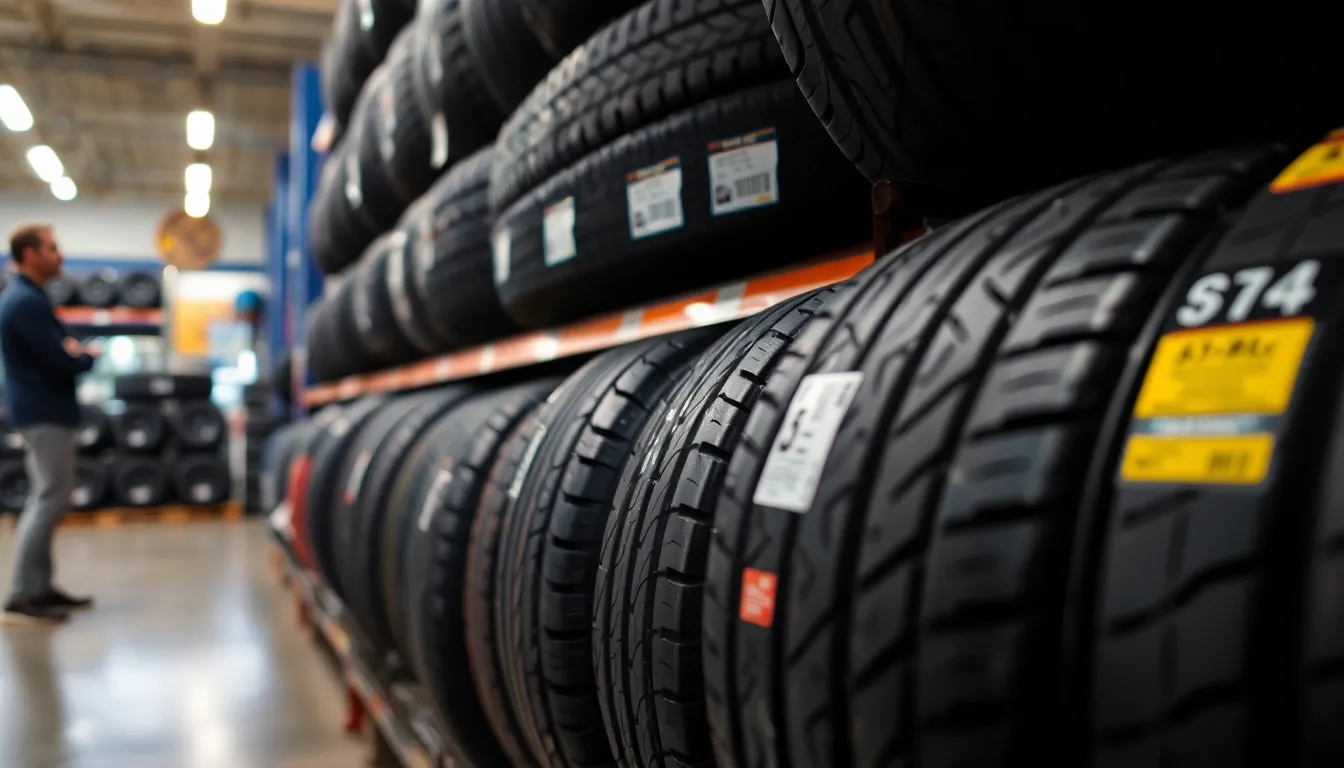
Tire costs for our 2007 Toyota Corolla vary significantly based on brand selection, performance features, and installation requirements. Budget options for the standard 195/65R15 size typically range from $60 to $90 per tire, while premium brands can cost $120 to $180 each. Quality tires in the mid-range category offer the best value proposition for most Corolla owners, providing balanced performance at $80 to $120 per tire.
Tires Plus stands out as a comprehensive retailer offering extensive catalogs specifically customized to our Corolla’s requirements. Their online platform allows us to compare tire types, sizes, and prices for each trim level, whether we drive the CE with 185/65R15 tires or the LE and S models with 195/65R15 specifications. Expert technicians provide installation services with convenient scheduling options and weekend availability, making tire replacement accessible for busy schedules.
Goodyear Tires maintains inventory matching our Corolla’s OEM specifications across their retail network. Their locations stock reliable brands focusing on durability, fuel efficiency, and all-season performance characteristics that complement our vehicle’s engineering. Direct manufacturer warranties and road hazard protection plans add value to tire purchases from authorized Goodyear dealers.
Local tire shops often provide competitive pricing and personalized service for Corolla owners seeking cost-effective answers. Independent retailers frequently offer package deals including mounting, balancing, and disposal of old tires. Building relationships with local technicians creates opportunities for ongoing maintenance support and early notification of tire sales or promotions.
| Trim Level | Tire Size | Price Range | Recommended Retailers |
|---|---|---|---|
| CE | 185/65R15 | $60-$180 | Tires Plus, Goodyear, Local Shops |
| LE | 195/65R15 | $65-$185 | Tires Plus, Goodyear, Local Shops |
| S | 195/65R15 | $65-$185 | Tires Plus, Goodyear, Local Shops |
Installation fees typically add $15 to $30 per tire to the total cost, depending on the retailer and included services. Balancing, valve stems, and disposal charges may apply as separate line items. Booking appointments online often provides discounts on installation services and reduces wait times during peak seasons.
Seasonal promotions occur frequently at major retailers, particularly during spring and fall when many drivers replace their tires. Rebate programs from tire manufacturers can reduce costs by $40 to $100 when purchasing complete sets. Comparing prices across multiple retailers ensures we secure the best value for our Corolla’s tire replacement needs.
Conclusion
Armed with the right tire knowledge you can now confidently maintain your 2007 Toyota Corolla’s performance and safety. We’ve covered everything from understanding the factory 195/65R15 specifications to exploring alternative sizing options that suit your driving needs.
Remember that proper tire selection goes beyond just matching numbers – it’s about finding the right balance of performance comfort and cost for your exact situation. Whether you stick with OEM specifications or explore plus sizing options the key is maintaining proper inflation and regular maintenance.
Your Corolla’s tire choices directly impact fuel economy handling and overall driving experience. By following our guidelines and shopping smart you’ll ensure your vehicle continues delivering the reliable performance Toyota engineered into this popular model.
Frequently Asked Questions
What is the standard tire size for a 2007 Toyota Corolla?
The standard tire size for a 2007 Toyota Corolla is 195/60R15 across all trim levels. However, the CE trim uses 185/65R15 tires, while S and LE trims come with 195/65R15 tires. These dimensions were specifically chosen by Toyota engineers to optimize fuel efficiency, handling, and comfort for each model variant.
What do the numbers on my Corolla’s tire sidewall mean?
The tire size marking breaks down as follows: the first number (195) represents tire width in millimeters, the second number (65) is the aspect ratio (sidewall height as a percentage of width), “R” indicates radial construction, and the final number (15) shows the rim diameter in inches. Additional markings include load index and speed ratings.
Can I use different tire sizes on my 2007 Corolla?
Yes, you can use alternative sizes like 215/55R16, 205/65R15, or 185/70R15, but you must maintain the same overall diameter. Plus sizing (wider tires with lower sidewalls) can improve handling but may reduce ride comfort and fuel economy. Always verify compatibility with your specific trim level before purchasing.
What is the recommended tire pressure for a 2007 Toyota Corolla?
The recommended tire pressure varies by tire size and load conditions. Check the tire information placard located on your driver’s side door jamb for exact specifications. Proper inflation is crucial for optimal fuel efficiency, even tread wear, and maintaining the intended contact patch with the road surface.
How much do replacement tires cost for a 2007 Corolla?
Budget tires for the standard 195/65R15 size typically range from $60 to $90 per tire, while premium brands cost $120 to $180 each. Installation fees and seasonal promotions can affect total costs. Compare prices across multiple retailers, including Tires Plus, Goodyear, and local tire shops for the best value.
What are the best tire brands for a 2007 Toyota Corolla?
Recommended tire brands include Goodyear Assurance All-Season, Michelin Premier A/S and Defender, Bridgestone Turanza EL440-02, and Continental PureContact. For performance upgrades, consider Goodyear Eagle Sport All-Season or Michelin Pilot Sport A/S, which offer improved grip and handling but may slightly reduce fuel economy.
How often should I check my Corolla’s tire pressure?
Check tire pressure monthly and before long trips. Tire pressure can fluctuate with temperature changes, affecting performance and fuel efficiency. Use a reliable pressure gauge and adjust according to the specifications on your tire information placard. Proper maintenance ensures safety and extends tire life.
What is the load rating and speed index for factory Corolla tires?
Factory tires typically have a load index of 89, supporting up to 1,279 pounds per tire, and an H-speed rating allowing sustained speeds up to 130 mph. Never replace tires with lower ratings than factory specifications, as this can compromise safety, handling characteristics, and vehicle performance.

